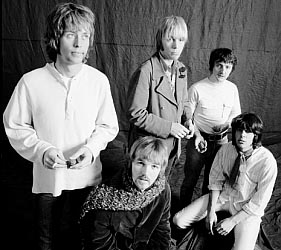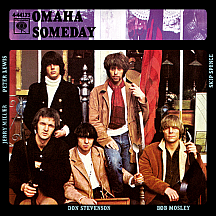MOBY GRAPE
Omaha
The word was out on a hot new band from San Francisco. The top record labels raced to zero in and sign the act to a contract. Egos inflated very quickly. Then Moby Grape wound up in the netherworld of major label acts, which isn't exactly what Columbia Records, the company that won the band over to their side, intended. The group's members had come together from various west coast locations in the mid-1960s. Bob Mosley played bass for San Diego band The Misfits in 1964 (their one single was "This Little Piggy" on Imperial) and later worked some studio sessions in Los Angeles with Joel Scott Hill (former lead guitarist for The Strangers). Guitarist Jerry Miller and drummer Don Stevenson were late arrivers to the lineup of Seattle rock stalwarts The Frantics; the band relocated to San Francisco and Mosley joined for awhile, but before long all three took their leave. After that, Jerry and Don played together in a band called Marsh Gas, its name alone assuring obscurity.
Guitarist Peter Lewis came from a complicated family background. He was the eldest son of Oscar-winning actress Loretta Young and, despite his eventual place in rock's subculture, is the least notorious of Young's three children (older half sister Judy Lewis was the illegitimate outcome of an affair with actor Clark Gable, living with the stigma of being called "a walking mortal sin" by her mother; younger brother Christopher Lewis was a filmmaker arrested in 1973 on child pornography charges). Peter and the Wolves was the name of Peter's pre-Grape group. Quicksilver Messenger Service six-string alumnus Alexander "Skip" Spence had gained minimal experience as a drummer with his high school marching band years earlier. Marty Balin hand-picked him for the position of Jefferson Airplane's original tub-thumper, but he quit after the first album, Jefferson Airplane Takes Off. He focused strictly on his axe after that, alternating lead and rhythm guitar roles with Moby Grape during his time with the group (later, under the influence of LSD, he splintered a hotel room door with a different kind of axe).
The five started jamming together in the summer of 1966. The name was Mosley's idea, based on a joke that small children, at least, thought was funny: "What's purple and lives in the ocean?" A few gigs in the Bay Area was all it took for word to get out. Before long reps from several major labels came sniffing around. The band recorded a demo with Paul Rothchild of Elektra Records that fall, but it didn't lead to anything. Airplane manager Matthew Katz handled the Grape's business affairs in control-freak fashion, but not for very long. They severed ties with him in '67, prior to their label debut that summer, but the divorce came at a steep price: Katz obtained legal rights to the Moby Grape name, guaranteeing him a piece of the action regardless of physical proximity.
Another major label suitor, Ahmet Ertegun of Atlantic Records, claimed the band had committed to signing with him, but they called to inform him that David Rubinson of Columbia had convinced them otherwise (by promising the sun, the moon and the stars, it seems). Ertegun then suggested they release five singles simultaneously...hey, wouldn't it be great to dominate the charts the way The Beatles had back in '64? They bought into the devilish suggestion but, as Ahmet was well aware would happen, radio didn't buy into the hype. No one wanted to play five songs by a new act and record distributors had no interest in dealing with five singles all at once. Columbia threw a lavender-splashed event in June '67 to introduce the band to the media, handing out purple velvet press kits containing the five 45s and bottles of wine with Moby Grape labels, but no corkscrews to open them with. When I met Ahmet Ertegun years later, he proudly proclaimed, "I killed the band!" but he really only deserves a tiny percentage of the credit/blame; some of that goes to Columbia's mishandling, but mostly it was the band members who sabotaged themselves.
The guys had talent, that much was obvious. They composed all of their own music, most of the songs spread over four albums released between '67 and '69. Recreating the studio vibe onstage presented a challenge, as they'd spent little time performing live before getting sucked up in the whirlwind. The five-45s-at-once promotional gimmick (Columbia 44170 through 44174) careened out of control, though two singles managed to show up on the national charts. The first three, "Changes," "Sitting by the Window" and breakup ballad "8:05" went by the wayside, while the fourth one in line was a hyped-up, two-and-a-half minute blast of drums and rapid-fire guitars with only one weakness: its confusing title (lyrical hook 'Listen my friends...' is repeated again and again, but when asked by Columbia execs what the title was, writer Spence said "Omaha," the first thing that popped into his head, though the song had nothing to do with Nebraska's largest city). "Omaha" spent just three weeks on the low end of Billboard's Hot 100 in July. The fifth single, "Hey Grandma," paid tribute to the girls in their granny dresses at the 'SF freak scene' and made a minor impact (say, ten days' worth) the same month. The album sold respectably if unspectacularly. Meanwhile, the Beatles (with Sgt. Pepper's Lonely Hearts Club Band), The Doors (with "Light My Fire") and a Slicked-up, Surrealistic Jefferson Airplane, sans Skip, stole the psychedelic glory in the summer of '67.

The band's behavior didn't help matters. Within hours of Columbia's launch party for Moby Grape, Miller, Lewis and Spence managed to get arrested for contributing to the delinquency of a trio of underage girls; possession of a wee bit of marijuana didn't help matters, though they managed to get the charges dropped. Then someone at Columbia noticed the album, already in release with a cover photo taken in front of an antique store, showed Don Stevenson extending his middle finger in front of a washboard he was holding! Perhaps it was an oversight...or maybe Columbia's art department noticed it and went along with the joke, as willing as anyone to "stick it to the man" whenever possible. At any rate, the album had gone out with the offensive gesture intact (Stevenson later admitted he'd made attempts that day to "flip the bird" on every shot the photographer took). The incensed heads of Columbia airbrushed the offending finger on later pressings; lucky for them the picture sleeves for the 45s (using the same photo on all five) had cropped the shot, but that coincidence seems a little too convenient - maybe it was all done on purpose for the publicity!
Whether intentional or not, all this horseplay created only mild curiosity. Lack of airplay beyond underground FM stations (of which there were few at the time) failed to fuel sales beyond a certain point. Lewis, Miller, Stevenson, Mosley and Spence began acting like rock stars before actually earning such a tag; they took far too many drugs, didn't get along real well (when it came to songwriting, each worked separately save for Jerry and Don) and sometimes recorded with only one or two band members present. They moved from L.A. to New York City in the hopes of working in a more professional studio environment. Skip Spence was the first to go off the deep end, insisting they change the group's name to The Cows! Before long his mental lapses secured him a round-trip ticket for half a year at Bellevue Hospital. Everything seemed to go wrong, whether the Grapesters were bluffing their way through concerts, working to expand their minds medicinally, playing at laying down tracks in the studio or struggling to untie legal entanglements. In other words, the same thing all the successful bands were going through, only this band's peak of popularity had already gone south by way of "Omaha," just one month after its Big Debut.
The four remaining band members headed back to the bay, each buying a house in Boulder Creek, California, where they worked on their third and fourth albums. Bob Mosely quit in early 1969 and joined the Marines, presumably to bring some normalcy to his life (an extreme way to go about it, I'd say). Matthew Katz sued the band for a million bucks and put together an ersatz Moby Grape that toured as the real thing, causing further confusion. After their fourth album, Truly Fine Citizen, Peter Lewis, Jerry Miller and Don Stevenson gave up the Grape as the decade neared its end. All five original members reunited in 1971 with a new label, Reprise, then split again within months. Reunions occurred every so often with various band members. They eventually pried their rightful name away from the vice grip Katz had on it for 40 years; by that time lung cancer had already taken its toll on Skip Spence.


